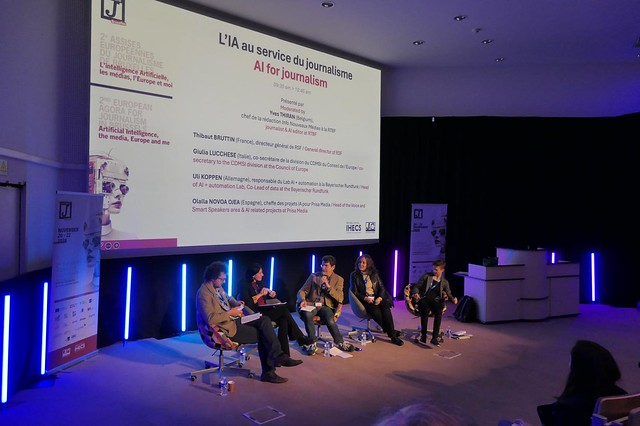Thibaut Bruttin (France), director general of Reporters Without Borders, Giulia Lucchese (Italy), co-secretary to the CDMSI division at the Council of Europe, Ulrike Köppen (Germany), Head of Al + Automation Lab, co-Lead of BR Data at the Bayerischer Rundfunk, Olalla Novoa Ojea (Spain), head of the Voice and Smart Speakers area & Al related projects at Prisa Media.
Moderated by Yves Thiran, journalist and AI editor at RTBF (Belgium).
Key issues
AI and journalism, how can journalist change their perception of AI?Innovation in media environment should be encouraged whereas the canopy of responsibility should be established. One of its usages can be through personalisation.
What they said:
Ulrike Köppen (Head of Al + Automation Lab, Co-Lead of BR Data at the Bayerischer Rundfunk): “Personalisation is a structural necessity for universal public access to our journalism.”
“A.I. can be seen as a mean to offer a better service to the audience, [which is increasingly] large and heterogenous.”
Olalla Novoa Ojea, Head of the Voice and Smart Speakers area & Al related projects at Prisa Media: “[We] use A.I. for [our] expansion by collecting data from [our] viewers.”
“[We] are able to develop [our] content […] installing lines of work with A.I. which includes search engine indexing, audio recommendation, profiled analytics […].”
Giulia Lucchese, co-secretary to the CDMSI division at the Council of Europe: “There is a necessity to concentrate on training journalists to be able to face and genuinely handle the A.I. tools without placing the traditional values [of media] into the shadow.”
Takeaways
States can develop initiatives to foster data, media and AI literacy in collaboration with NGOs and news organisations. But to know the limit between ethics and the usage of AI in production of contents. It is important to establish the border which can be quite indistinct. National media should be accountable for their output.
Christèle AVOM (EPJT)
